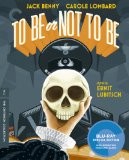| Reviews & Columns |
|
Reviews DVD TV on DVD Blu-ray 4K UHD International DVDs In Theaters Reviews by Studio Video Games Features Collector Series DVDs Easter Egg Database Interviews DVD Talk Radio Feature Articles Columns Anime Talk DVD Savant Horror DVDs The M.O.D. Squad Art House HD Talk Silent DVD
|
DVD Talk Forum |
|
|
| Resources |
|
DVD Price Search Customer Service #'s RCE Info Links |
|
Columns
|
|
|
To Be or Not to Be: The Criterion Collection
THE MOVIE:
Please Note: The stills used here are taken from promotional materials and other sources, not the Blu-ray edition under review.
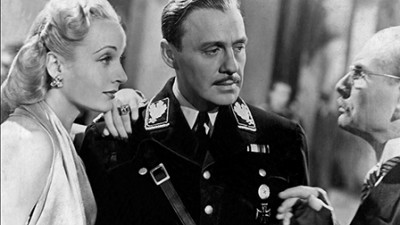
Comedy can be serious business, particularly when it is making light of dark subjects. When Mel Brooks made The Producers in 1967, two decades after World War II, he met resistance from people who didn't think Hitler and his Nazis should be the subject of satire. Brooks saw it a different way: he was depowering the evildoers by making them the object of ridicule. They rule by terror, but it's hard to be terrorized when you're laughing.
Of course, Brooks was not the first one to have this idea. Ernst Lubitsch wanted to achieve a similar outcome with his 1942 motion picture To Be or Not to Be. Made while the war was at its height, To Be or Not to Be was seen by some of lacking in taste. "Too soon" as the sensitive and humorless often cry. Lubitsch wanted to vilify the Fuhrer by undermining his villainy. You can't beat us because we refuse to be beaten. (Years later, Mel Brooks would close the circle by starring in a remake of To Be or Not to Be.)
Jack Benny and Carole Lombard star in To Be or Not to Be as Joseph and Maria Tura, Poland's top stage actors. At the start of the film, they are set to open a new play dramatizing life within the Gestapo. Political pressures and Germany's invasion of Poland put the kibosh on the show. Instead, the troupe carries on with their production of Hamlet.
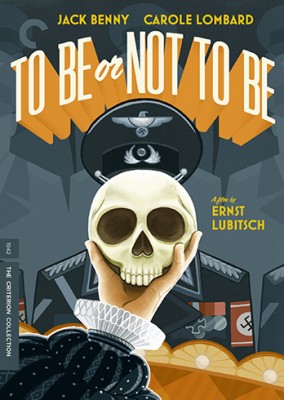
The title, To Be or Not to Be, is, of course, a reference to Hamlet's best-known soliloquy. It's significant to the story because Maria has deemed the start of the speech as a cue to an admirer to visit her backstage. The smitten fan is a pilot named Sobinski (played by a young Robert Stack). It also poses the existential question that ultimately leads the theatre company into helping out the Resistance: to be or not to be a hero, to be or not a passive victim. The opportunity comes when Sobinski returns to Poland from combat, hoping to stop a Nazi spy (Stanley Ridges) carrying sensitive information. When Sobinski is outfoxed by his quarry and Maria inadvertently put in a sensitive situation, her husband and their co-workers try to help out. First they pose as Gestapo officials in hopes of intercepting the intel, and then Joseph poses as the actual spy so he can use the connection to get everyone out of the country. Unsurprisingly, each ruse is subject to unforeseen complications, and before they know it, they are in so deep, one of the actors even ends up pretending to be Hitler himself.
Lubitsch's script, which he co-wrote with Edwin Justus Mayer (The Buccaneer), smartly valued story over shtick, and so the tightly plotted narrative allows for as much drama and suspense as it does jokes; indeed, the trick of To Be or Not to Be is how Lubitsch takes his very straightforward scenarios and finds the humor within them, injecting each moment with wit and letting character flaws disrupt everyone's efforts. The Nazis consistently trip themselves up by being more concerned with appearance and perception than anything else, and Joseph gets himself and his friends in further trouble due to jealousy. Comedy grows out of selfish behavior and a distorted sense of self-awareness.
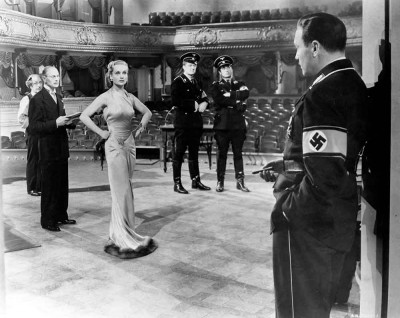
Jack Benny is incredible as Joseph. He is at his most droll here, and rather than fall back on his famous persona, he puts his trust in the material. There's no need to spice up the lines, the writing is perfect as is. Carole Lombard is also very funny, as well as beguiling. She often provides the emotional pull in the film, either by being in danger herself or by being the first to realize how wrong something may be going. Also of note are Felix Bressart and Tom Dugan as the theatrical troupe's regular character actors/support team. Like many a Shakespearean side duo, they serve as added comic relief, their commentary on the happenings providing insight and laughs in equal measure. Dugan is the one who disguises himself as Hitler, but it's Bressart's Greenberg who makes the ultimate sacrifice--and thus gets the starring role he always hoped for.
While there are plenty of laughs, Lubitsch never loses sight of the tragedy going on all around these characters. A montage of post-invasion destruction reminds us of who the German army's major targets were, and the lingering threat, as well as the SS's callow participation in it, means the potential consequence is never dulled. Lubitsch's gamble pays off: as audiences, we are invested precisely because we are enjoying ourselves. These merry men and woman make us laugh, and so we care about what happens to them. We like them, and we want to keep on liking them, and by logical extension, we hate anyone that would make the laughter stop.
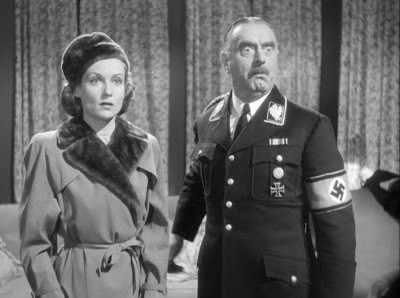
THE BLU-RAY
Video:
Criterion's Blu-ray edition of To Be or Not to Be delivers the fullscreen (1.37:1), black-and-white image as a 1080p transfer, MPEG-4 encoded. The image is clear throughout, with no hints of distortion or extraneous noise, scratches, dirt, etc. Lights and darks have strong contrast, and the level of detail apparent is exceptional. There is a fine grain, but nothing that over-saturates the image and no evidence of any added enhancement.
Sound:
The lossless mono soundtrack is also quite good, with well-modulated volume and tone. Dialogue is always easy to hear, and the music has nice oomph.
Subtitles for the deaf and hearing impaired are provided for those who need them.
Extras:
To Be or Not Be is packaged in a clear Blu-ray case with striking artwork and a nice booklet, featuring an essay on the film and Lubitsch's defense of his movie against early critics.
Film historian David Kalat has recorded an all-new audio commentary for the Criterion edition of To Be or Not to Be, going into heavy detail on the history of the production and its participants. There is also a nearly hour-long TV documentary on Lubitsch, Lubitsch le patron, made for French television in 2010.
Old-time radio fans will enjoy the two audio programs included here, both episodes of The Screen Guild Theater. 1940's "Variety" features Jack Benny, Claudette Colbert, and Ernst Lubitsch appearing as themselves, while the 1942 episode actually adapts To Be or Not to Be, but starring William Powell and Diana Lewis.
The meatiest extra, however, is the inclusion of Lubitsch's 1916 silent film, Pinkus's Shoe Palace. Produced in Germany, the 45-minute movie is a slight comedy, perhaps most notable for being one of the last vehicles in which Lubtisch starred himself. He plays his regular comedic persona, a gadabout whose schemes lead him to success. This restored version has a new score by pianist Donald Sosin.
All of the supplements are in HD.
FINAL THOUGHTS:
Highly Recommended. As funny and provocative today as it was seventy years ago, Ernst Lubitsch's wartime comedy To Be or Not to Be is an exceptional example of social satire and cinema's power to entertain and move audiences. Jack Benny and Carole Lombard both give exceptional performances (her last) as a pair of Polish stage actors who find themselves embroiled in an espionage plot after Germany invaded Poland. The elaborate scenario by which they and their fellow actors pretend to be SS officers, spies, and even Adolph Hitler himself is clever, smartly constructed, and above all, full of great jokes. You'll laugh a lot watching To Be or Not to Be, aided by the exceptional new Blu-Ray presentation.
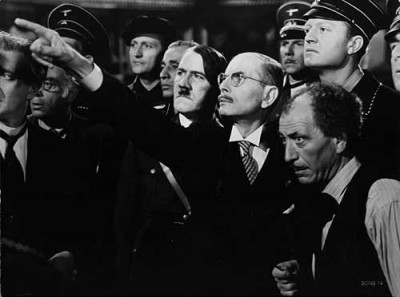
Jamie S. Rich is a novelist and comic book writer. He is best known for his collaborations with Joelle Jones, including the hardboiled crime comic book You Have Killed Me, the challenging romance 12 Reasons Why I Love Her, and the 2007 prose novel Have You Seen the Horizon Lately?, for which Jones did the cover. All three were published by Oni Press. His most recent projects include the futuristic romance A Boy and a Girl with Natalie Nourigat; Archer Coe and the Thousand Natural Shocks, a loopy crime tale drawn by Dan Christensen; and the horror miniseries Madame Frankenstein, a collaboration with Megan Levens. Follow Rich's blog at Confessions123.com.
|
| Popular Reviews |
| Sponsored Links |
|
|
| Sponsored Links |
|
|
| Release List | Reviews | Shop | Newsletter | Forum | DVD Giveaways | Blu-Ray | Advertise |
|
Copyright 2024 DVDTalk.com All Rights Reserved. Legal Info, Privacy Policy, Terms of Use,
Manage Preferences,
Your Privacy Choices | |||||||









